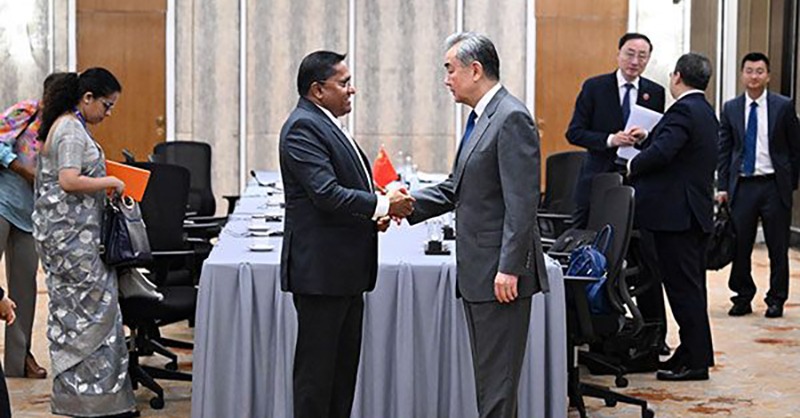-By LeN Diplomatic Editor

(Lanka-e-News -13.July.2025, 11.00 PM) Kuala Lumpur–China has reaffirmed its commitment to deepen its strategic partnership with Sri Lanka, pledging to elevate bilateral cooperation to what it termed a “new high,” even as geopolitical currents continue to reshape the Indo-Pacific region.
Speaking during a high-level meeting with Sri Lanka’s Foreign Minister Vijitha Herath in Kuala Lumpur on July 12, Chinese Foreign Minister and senior Communist Party official Wang Yi made clear Beijing’s readiness to intensify collaboration in both traditional and emerging spheres of engagement.
“China stands prepared to advance its longstanding and friendly strategic cooperative partnership with Sri Lanka, based on mutual respect and shared development goals,” Wang declared, underscoring what observers see as a renewed Chinese push for regional influence through infrastructure diplomacy.
The remarks come in the wake of a virtual meeting earlier this year between Chinese President Xi Jinping and Sri Lankan President Anura Kumara Dissanayake, during which both leaders reportedly agreed to solidify their nations' ties under what they described as a “community with a shared future.”
Central to the conversation was the Belt and Road Initiative (BRI)—China’s flagship global infrastructure programme—which has seen billions of dollars invested in Sri Lanka over the past decade, including in landmark ventures such as the Colombo Port City and Hambantota Port.
“These flagship projects must now move from blueprint to full-scale implementation,” Wang stated, calling for “high-quality progress” on Colombo Port City and a renewed thrust in developing the strategically vital Hambantota harbour.
He also emphasised the need to accelerate talks on the China–Sri Lanka Free Trade Agreement, which has remained stalled since 2018 amid Sri Lankan concerns over trade imbalances.
While reiterating China's support for Sri Lanka’s economic recovery, Wang subtly criticised Western-led Indo-Pacific strategies, stating that initiatives like the ‘Indo-Pacific Economic Framework’ (IPEF) had “failed to garner genuine regional support.” This was widely interpreted as a swipe at Washington’s attempt to counterbalance Beijing’s economic influence in South and Southeast Asia.
In response, Foreign Minister Vijitha Herath offered an unequivocal endorsement of Beijing’s role as Sri Lanka’s “most reliable development partner,” especially during the island’s most difficult years.
“Sri Lanka remains firmly committed to the One-China Policy,” Herath declared, reaffirming the country's diplomatic line in recognising Beijing’s sovereignty over Taiwan—a move sure to please Chinese officials increasingly wary of global shifts on the Taiwan question.
He further noted Sri Lanka’s gratitude for China’s “timely and meaningful support” during the nation’s 2022–23 financial crisis, which saw Beijing extend critical debt relief and emergency supplies as the country teetered on the brink of default, agreed for $7 Billion debt write off, in order to implement the IMF bailout, otherwise Sri Lanka never recover from the Economic desaster.
“The strategic cooperation between our two countries has not only delivered tangible benefits to the Sri Lankan people but has also reinforced regional development and stability,” Herath said.
The encounter in Kuala Lumpur comes at a critical juncture for Sri Lanka, which is attempting to balance its economic imperatives with the competing influences of China, India, and the West.
While Colombo has signalled a desire to remain non-aligned, its increasing reliance on Chinese loans, grants, and infrastructure has drawn concern in Western capitals, particularly over the long-term implications of Beijing's involvement in strategic coastal assets.
Analysts say China’s renewed diplomatic charm offensive is part of a broader attempt to shore up its influence among smaller Indian Ocean nations amid growing American and Indian presence in the region.
-By LeN Diplomatic Editor
---------------------------
by (2025-07-13 18:56:23)
Leave a Reply